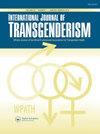适应不良人格特质、防御机制与反式消极态度
Q1 Social Sciences
引用次数: 1
摘要
摘要目的:尽管人们对反性态度和行为的研究越来越感兴趣,但很少有研究调查与之相关的心理变量。本研究旨在探讨跨性别者的心理病理症状、防御方式、人格特质与对跨性别者的消极态度之间的关系。方法:对165名被试进行心理病理症状(SCL-90-R)、防御风格(REM-71)、适应不良人格特征(PID-5-BF)、反跨性别态度(ATTI)和社会人口学特征的问卷调查。采用四步层次多元线性回归分析,探讨这些变量对反跨性别态度的预测作用。结果:成熟防卫对反式消极态度有显著的负向作用,而拮抗特质对反式消极态度有显著的正向作用。政治和宗教信仰可以预测对跨性别者的负面态度,而其他预测因素没有发现影响。我们还发现年龄的显著影响以及性取向和性别之间的相互作用,异性恋男性比非异性恋男性表现出更高的反性消极水平。结论:该研究强调了人格和社会结构在对跨性别者产生消极态度的易感性中的重要性。因此,未来的研究应考虑到个性和社会变量。本文章由计算机程序翻译,如有差异,请以英文原文为准。
Maladaptive personality traits, defense mechanisms, and trans-negative attitudes
ABSTRACT Purpose: Although there is growing interest in trans-negative attitudes and behaviors, few studies have investigated the psychological variables associated with them. The present study aims to assess the relationship between psychopathological symptoms, defensive style, personality traits and negative attitudes toward transgender people. Methods: Participants (N = 165) were asked to complete several questionnaires assessing their psychopathological symptoms (SCL-90-R), defensive style (REM-71), maladaptive personality traits (PID-5-BF), antitransgender attitudes (ATTI), and sociodemographic characteristics. A four-step hierarchical multiple linear regression analysis was carried out to investigate the predictive role of such variables on antitransgender attitudes. Results: We found a significant negative effect of mature defenses and a positive effect of antagonistic traits on trans-negative attitudes. Political and religious beliefs predicted trans-negative attitudes, whereas no effect was found for the other predictors. We also found a significant effect of age and an interaction effect between sexual orientation and gender, with heterosexual men showing higher levels of trans-negativity than non-heterosexual men. Conclusions: The study highlights the importance of both personality and social constructs in predisposing to negative attitudes toward transgender people. Future research should therefore take into account both personality and social variables.
求助全文
通过发布文献求助,成功后即可免费获取论文全文。
去求助
来源期刊

International Journal of Transgenderism
Social Sciences-Gender Studies
CiteScore
5.10
自引率
0.00%
发文量
0
期刊介绍:
International Journal of Transgenderism, together with its partner organization the World Professional Association for Transgender Health (WPATH), offers an international, multidisciplinary scholarly forum for publication in the field of transgender health in its broadest sense for academics, practitioners, policy makers, and the general population.
The journal welcomes contributions from a range of disciplines, such as:
Endocrinology
Surgery
Obstetrics and Gynaecology
Psychiatry
Psychology
Speech and language therapy
Sexual medicine
Sexology
Family therapy
Public health
Sociology
Counselling
Law
Medical ethics.
 求助内容:
求助内容: 应助结果提醒方式:
应助结果提醒方式:


